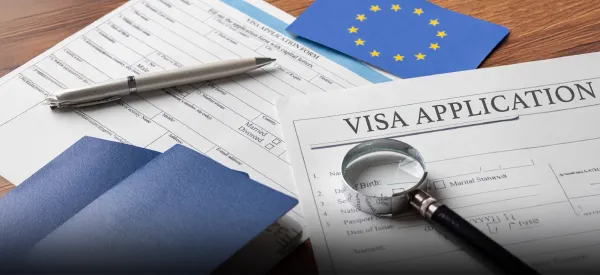E-Visa vs. On-Arrival Visa: Which applies to African Destinations?

Africa is one of the most underrated and beautiful travel destinations. While Europe and Asia are definitely on top of the list of travellers, if you are planning a trip this year, do check out the amazing Africa and its adventures. Travel to the lush jungles of Kenya, dive in the crystal clear waters of Zanzibar, and groove in the nightlife of Cape Town.
If you are a US or EU passport holder, Africa offers very smooth entry into the country. The most common African travel visa options are either an E-Visa or a Visa-on-Arrival. Some of the African countries also offer visa-free entry to US and EU citizens, which clears out all the hassle.
Here’s a small guide to help you understand the visa process for Africa
Visa-on-Arrival for US & EU Citizens
The US and EU citizens are privileged ones as they do not require a visa for most African countries. However, countries like Rwanda and Madagascar require a Visa-on-Arrival to enter. VOA means that the traveller needs to get a visa upon arrival at the designated airport. It is an easy process and it makes your travel smooth, especially if you're booking last minute or haven’t finalised every detail.
Travel hack: For Visa-on-Arrival countries, keep digital and printed copies of your travel documents handy to speed up the process and avoid delays at the airport.
Application Process for VOA
In Rwanda, US and EU citizens can get a visa-on-arrival by showing a valid passport, return ticket, and paying a small fee when applying for the VOA at the counter.In Madagascar, travellers must fill out a form upon arrival, show proof of accommodation and a return ticket, and pay a small fee (in cash).
Tips for VOA:- For VOA, carry the necessary documents, including a copy of the return flight, a hotel booking copy, passport photos, and proof of sufficient funds.- Passport validity is of utmost importance. Check that it is valid for 6 months from the date of entry. - Visa-On-Arrival is applicable for only a limited days. If you overstay your limit, then you might be charged a fee, or you can be banned from the country.- Keep the African currency handy as visa fees are often payable in cash, and some airports may not accept cards. You can also carry USD as it is widely accepted.

E-Visa for US & EU Citizens
imageFor US and EU citizens, some African countries require an e-visa for entry into the country. The electronic visa is a kind of online authorisation for a traveller that allows them to enter the country. In the e-visa scenario, you do not need to stand in long lines or visit the embassy. It reduces the paperwork and makes the process easier. This process is ideal for travellers who prefer to plan ahead and want to avoid long lines at the airport.African Countries that offer e-visas are Kenya, Tanzania, Egypt, Ethiopia, Uganda, and Zambia.
Tips for E-Visa
- Only use the official government portal to apply for an e-visa.
- Make a list of your entry requirements and double-check processing times.
- It is safe to print a copy of your visa and also keep digital files with you.
- Passport validity is of utmost importance. Check that it is valid for 6 months from the date of entry.
- Always carry a copy of your application, keep the reference number handy in your phone and star the approval email for easy finding.
Visa-Free African CountriesYou can travel to some African countries where US and EU citizens do not require a visa. Enjoy the vacation seamlessly and make endless memories. Here are the names of the countries where EU and US passport holders are allowed visa-free entry in Morocco, Senegal, Tunisia, South Africa, and Botswana.
Are you excited for your African adventure? Try TriWize, the best affordable flight booking website to enjoy your African vacation. Check multiple offers and deals, and also get 24-hour support and assistance. Fly with TriWize.
FAQs
1. Do all African countries offer e-Visas or Visa-on-Arrival for US and EU citizens?
No, visa policies vary by country. Always check the current scenario, rules and guidelines for a visa before planning your trip.
2. Can the authorities deny entry in Africa even with a Visa-on-Arrival?
Yes, entry is not guaranteed. If there are some issues found by the Immigration officers in your document or itinerary, then they can deny your entry into the country. Make sure that all your documents are available in hand with you, such as proof of accommodation, proof of sufficient funds, and return flight bookings.
3. How long does it typically take to get an e-Visa approval for African countries?
E-Visa processing times vary by country but usually take between 3 to 10 business days, so apply well in advance to avoid travel delays.
4. Are there additional fees for Visa-on-Arrival compared to e-Visas
Yes, Visa-on-Arrival fees can sometimes be higher or require cash payment at the airport, while e-Visas often allow online payment and can be more convenient and transparent.
5. Can I switch from a Visa-on-Arrival to an e-Visa if I change my travel plans?
It depends on the country’s rules; some countries allow you to apply for an e-Visa anytime before arrival, but others require you to stick to the original visa type, so check the regulations carefully.



